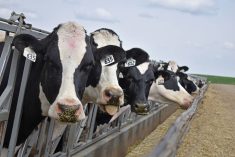Canadian dairy farmers are feeling relieved today, following a Supreme Court ruling related to interprovincial trade.
Supreme Court of Canada justices, in a decision released this morning, ruled that provincial governments can have regulations that restrict the flow of goods across provincial borders, provided the primary function of the regulation is not to impede trade.
The Supreme Court was looking at a case centred on Gerard Comeau, a New Brunswick man who bought beer in Quebec and brought it back to his home province.
The government of New Brunswick fined Comeau for “importing” the beer, but he appealed the penalty, citing Section 121 of Canada’s Constitution Act, 1867.
Read Also

Farming Smarter receives financial boost from Alberta government for potato research
Farming Smarter near Lethbridge got a boost to its research equipment, thanks to the Alberta government’s increase in funding for research associations.
It says products from any province should be “admitted free” into other provinces.
Lower courts ruled in favour of Comeau, but the Crown appealed.
In its unanimous decision, the Supreme Court said the primary purpose of the New Brunswick law, which prohibits the import of larger volumes of alcohol, is to prevent holding excessive quantities of liquor from supplies not managed by the province.
“While s. 134(b) in essence impedes cross border trade, this is not its primary purpose. Section 134(b) does not infringe s. 121 of the Constitution Act, 1867,” the justices wrote in their decision.
Comeau told the CBC that the ruling was absurd.
“It doesn’t make sense … because you can go in Quebec or any province and you can buy any quantity of merchandise, clothes, food, anything, except for beer.”
Dairy Farmers of Canada heralded the decision because it backs the status quo when it comes to interprovincial trade. If the Supreme Court had agreed with Comeau and his argument that products from other provinces should be “admitted free” into a province, it would have had ramifications for Canada’s supply management system for dairy, eggs and poultry.
“We are pleased that the Supreme Court has restored some certainty about various regulations of trade in place in Canada, including the validity of supply management,” Dairy Farmers said in a statement.
“This case validates the findings of previous court cases on interprovincial trade regulation of various agricultural and food products. Federal and provincial governments will continue to have the ability to cooperate on the regulation of interprovincial trade.”
Other groups were less pleased.
The Canadian Vintners Association said the Supreme Court missed an opportunity to knock down needless barriers to trade.
“Unfair interprovincial trade barriers have harmed Canada’s wine industry by making it difficult for Canadians to obtain premium small production wines from an out-of-province Canadian winery,” the association said.
“No other wine producing country has these kinds of restrictions. Canada’s wine industry had seen the ruling as a way to open the doors to direct-to-consumer wine purchases across the country, leading to improved consumer choice and an important growth opportunity for this country’s highest value agricultural industry.”
The Canadian Federation for Independent Business was also disappointed by the ruling.
The Supreme Court effectively said that provinces can pass laws that impede trade, as long as the purpose of the regulation isn’t to impede interprovincial trade.
“It still leaves a lot of wiggle room,” said Corinne Pohlmann, CFIB senior vice-president.
“(Provinces can say), ‘our intent is not to stem the flow of trade. If that’s incidental to what we’re trying to do, oh well.’ That’s the concern.”
The CFIB acted as intervener in the case of the Crown vs. Gerard Comeau, as did the Dairy Farmers of Canada, a number of wineries and the Canadian Chamber of Commerce.
With the ruling, organizations and businesses that support free trade will have to rely on the Canadian Free Trade Agreement, which the provinces and territories signed in April 2017. The deal took effect July 1, 2017.
The agreement says the provinces will work together to reduce barriers to trade, investment and worker mobility.
“Today’s decision means there’s even more onus on that agreement to really do what it says it’s going to do, which is to start to dismantle some of those trade barriers,” Pohlmann said.
“It’s unfortunate that the Supreme Court decision didn’t push that process along more quickly.”
Contact robert.arnason@producer.com


















